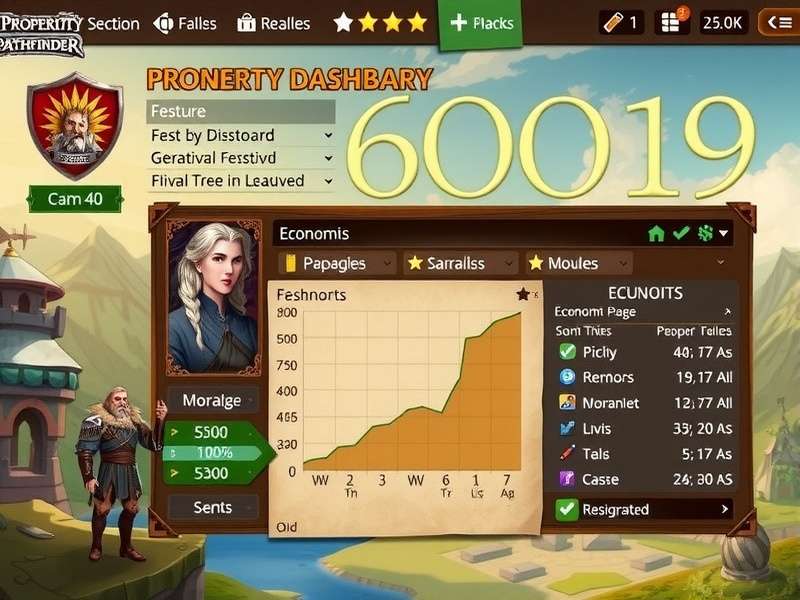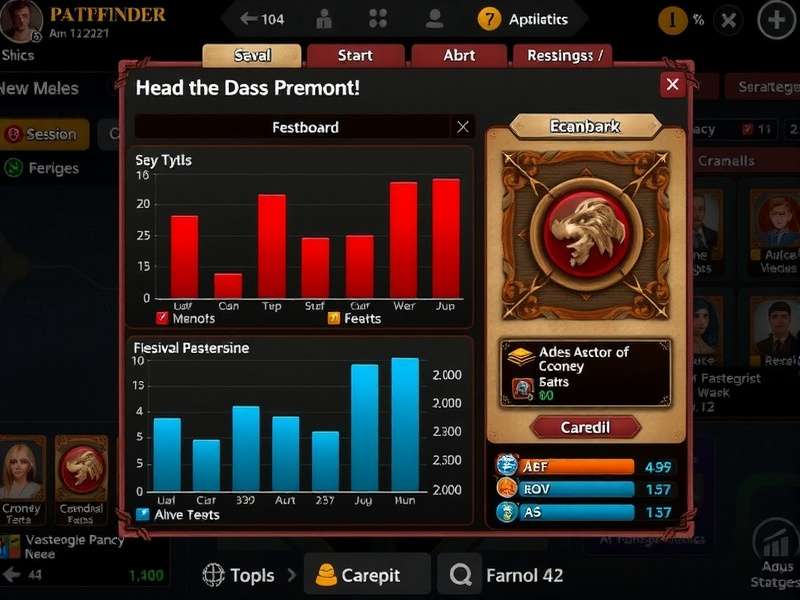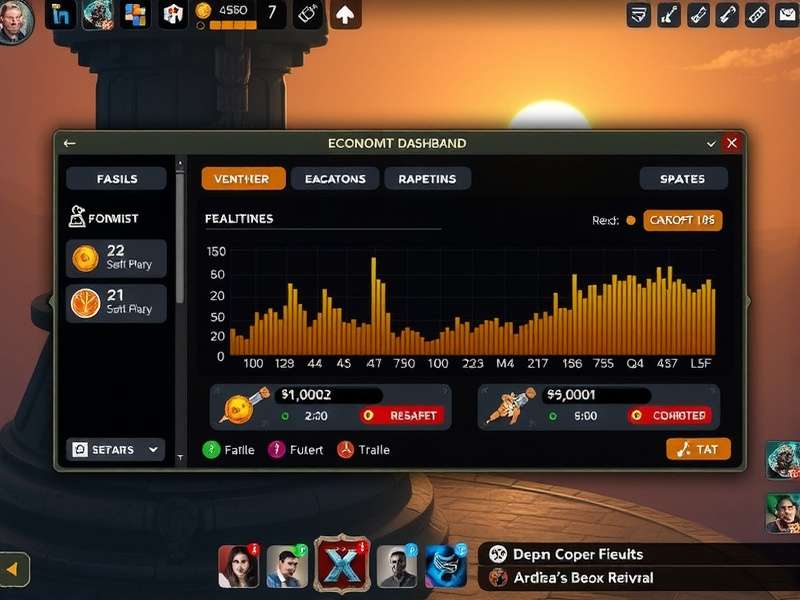? Game Overview & Cultural Significance
Prosperity Pathfinder represents a revolutionary approach to mobile gaming in the Indian market, blending traditional economic strategy with culturally resonant themes. Developed by Indian gaming studio Namaste Games, this title has captured the imagination of millions across the subcontinent.
The game's premise centers around building economic empires while navigating the complex tapestry of Indian business culture. Players assume the role of entrepreneurs starting from humble beginnings and working their way toward establishing multinational corporations.
What sets Prosperity Pathfinder apart is its authentic representation of Indian economic landscapes. From managing supply chains during festival seasons to understanding regional market variations, the game offers a uniquely Indian perspective on business strategy.

The cultural significance of Prosperity Pathfinder cannot be overstated. Launched during India's digital gaming boom, it has become a symbol of homegrown gaming innovation. The developers intentionally incorporated elements from Indian mythology, history, and contemporary business practices.
Players encounter challenges inspired by real Indian economic scenarios, such as managing agricultural commodity prices, navigating regulatory frameworks, and expanding into international markets while maintaining cultural authenticity. This approach has resonated deeply with Indian gamers seeking relatable content.
The success of Prosperity Pathfinder has demonstrated the viability of culturally specific gaming content in the Indian market. Industry analysts point to its player retention metrics as evidence that Indian audiences respond positively to games that reflect their own economic realities and cultural contexts.
? Core Gameplay Mechanics
At its heart, Prosperity Pathfinder employs sophisticated economic simulation mechanics wrapped in accessible gameplay. The learning curve is carefully designed to welcome newcomers while offering depth for strategy enthusiasts.
Players begin with a small business operation—often a neighborhood shop or local service—with limited capital. The initial phase focuses on understanding basic supply-demand dynamics, customer preferences, and cash flow management. This foundation prepares players for more complex decisions later.
The resource management system in Prosperity Pathfinder incorporates both tangible and intangible assets. Beyond financial capital, players must manage reputation, employee satisfaction, supply chain relationships, and regulatory compliance. This multidimensional approach mirrors real business challenges.
Economic Simulation
Dynamic market systems respond to player actions and in-game events, creating emergent gameplay scenarios.
Relationship Management
Cultivate business partnerships, manage employee morale, and navigate regulatory bodies.
One of the most praised mechanics is the "Cultural Intelligence" system. Players must develop understanding of regional differences across India—consumer preferences in Kerala differ significantly from those in Punjab, for example. This geographical awareness becomes crucial for expansion strategies.
The technology tree in Prosperity Pathfinder allows for diverse development paths. Players can specialize in traditional industries while incorporating modern technologies, or pursue disruptive innovation strategies. This flexibility enables multiple viable approaches to business growth.
Multiplayer interactions form another core component. Players can form business alliances, compete for market dominance, or engage in trade agreements. The social dynamics add layers of strategic complexity beyond the single-player economic simulation.
✨ Key Features & Innovations
Prosperity Pathfinder introduces several groundbreaking features that distinguish it from other strategy games in the mobile space. These innovations contribute significantly to its popularity and critical acclaim.
The "Festival Economy System" represents one of the game's most distinctive features. Major Indian festivals like Diwali, Eid, Christmas, and Pongal trigger special economic conditions. Players must anticipate these events and adjust their strategies accordingly to maximize profits.

Another innovative aspect is the "Regulatory Environment Simulation." Rather than presenting regulations as static obstacles, the game models how policies evolve in response to economic conditions and player lobbying efforts. This dynamic system creates engaging political economy gameplay.
The mentorship system allows experienced players to guide newcomers, earning rewards for both parties. This feature has fostered a supportive community and improved player retention. Senior players can establish business schools within the game to share specialized knowledge.
Mobile-First Design
Optimized for short play sessions with meaningful progression between logins.
Regional Adaptation
Game mechanics adapt to reflect economic conditions in different Indian states.
Educational Value
Teaches real economic principles through engaging gameplay scenarios.
The "Economic Crisis Management" feature introduces unexpected challenges like currency fluctuations, supply chain disruptions, or sudden policy changes. Players must navigate these crises using strategic reserves, alternative suppliers, or creative problem-solving.
Prosperity Pathfinder also stands out for its commitment to ethical gaming practices. The monetization system focuses on convenience and cosmetics rather than pay-to-win mechanics. This approach has earned praise from both players and industry watchdogs.
? Winning Strategies & Advanced Tips
Mastering Prosperity Pathfinder requires both strategic planning and adaptive thinking. Successful players combine economic theory with practical business intuition to build sustainable enterprises.
The foundation of any successful Prosperity Pathfinder strategy begins with specialization. While diversification has its benefits, focusing on a core competency initially allows players to establish market dominance in a specific sector before expanding.
Cash flow management proves critical, especially in the early game. Maintaining adequate liquidity to weather unexpected challenges separates successful entrepreneurs from those who face bankruptcy. The most skilled players maintain emergency funds equal to at least three months of operating expenses.

Understanding the demographic simulation is another key to success. Different customer segments in Prosperity Pathfinder have distinct preferences and purchasing patterns. Tailoring products, marketing, and pricing to specific demographics dramatically improves conversion rates.
The technology adoption curve in Prosperity Pathfinder mirrors real-world patterns. Early adoption of promising technologies can provide competitive advantages, but carries higher risks. More conservative approaches may miss opportunities but avoid costly failed implementations.
Advanced players leverage the political economy mechanics to shape the regulatory environment. By building relationships with in-game regulatory bodies and participating in policy discussions, players can influence rules in ways that benefit their business models.
Multiplayer dynamics introduce both risks and opportunities. Forming strategic alliances can provide access to new markets and shared resources. However, players must carefully manage these relationships to avoid dependency or exploitation.
The most successful Prosperity Pathfinder players maintain detailed records of their decisions and outcomes. This practice of reflective gameplay accelerates learning and helps identify patterns that lead to success or failure in different economic conditions.
? Community & Cultural Impact
The Prosperity Pathfinder community has evolved into one of the most engaged and constructive gaming communities in India. Players regularly share strategies, form business partnerships, and collaborate on complex economic projects.
Online forums and social media groups dedicated to Prosperity Pathfinder have become hubs of knowledge exchange. Experienced players frequently create detailed guides covering specific aspects of the game, from regional expansion strategies to technology adoption timelines.
The game's educational potential has attracted attention beyond the gaming community. Several business schools in India have incorporated Prosperity Pathfinder into their curriculum as a simulation tool for teaching economic principles and strategic thinking.
Cultural impact extends to how the game represents Indian business practices. By modeling both traditional commerce and modern entrepreneurship, Prosperity Pathfinder has sparked conversations about India's economic evolution and future direction.
The developers maintain an active dialogue with the player base, regularly incorporating community feedback into updates and expansions. This collaborative approach has fostered strong player loyalty and sustained engagement over multiple years.
Community-organized tournaments and challenges have emerged as significant aspects of the Prosperity Pathfinder experience. These events often focus on specific business scenarios or economic conditions, testing players' adaptability and strategic creativity.
Perhaps the most significant cultural impact has been Prosperity Pathfinder's role in changing perceptions about gaming in India. By combining entertainment with educational content, the game has gained acceptance among demographics traditionally skeptical of video games.
? Future Developments & Expansions
The development roadmap for Prosperity Pathfinder includes ambitious expansions that will further enhance the gaming experience. The developers have outlined a multi-year plan focusing on both content additions and technical improvements.
The upcoming "Global Expansion" update will allow players to take their businesses international. This addition will introduce new mechanics for navigating trade agreements, currency exchange, and cross-cultural business practices beyond India's borders.
Enhanced artificial intelligence represents another priority. Future updates will feature more sophisticated competitor AI that adapts to player strategies, creating more dynamic and challenging gameplay scenarios. The economic simulation will also become more nuanced.
Virtual reality integration is being explored for a potential premium version of Prosperity Pathfinder. This would allow players to immerse themselves in their business empires through VR interfaces, though the core mobile experience will remain the focus.
Educational partnerships will expand, with more formal integration into business and economics curricula. The developers are working with educational institutions to create specialized versions tailored for classroom use with enhanced analytics for instructors.
The long-term vision for Prosperity Pathfinder includes establishing it as a platform for economic simulation beyond entertainment. The underlying systems could potentially be adapted for professional training, policy testing, and economic research applications.
Community-driven content creation tools are in development, which would allow players to design their own business scenarios, economic conditions, and challenges. This user-generated content approach could significantly extend the game's lifespan and variety.
As mobile technology advances, Prosperity Pathfinder will leverage new capabilities for more sophisticated simulations. The developers have committed to maintaining the game's accessibility while gradually increasing its depth to satisfy both casual and hardcore strategy fans.